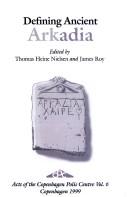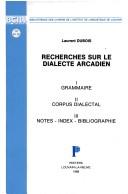| Listing 1 - 7 of 7 |
Sort by
|
Book
Year: 1967 Volume: 15 Publisher: Wien : Osterreichisches archäologisches Institut,
Abstract | Keywords | Export | Availability | Bookmark
 Loading...
Loading...Choose an application
- Reference Manager
- EndNote
- RefWorks (Direct export to RefWorks)
Arcadia, Greece --- Arcadia --- Religion
Book
Year: 1943 Publisher: Lund : A.B. Gleerupska Universitetsbokhandeln,
Abstract | Keywords | Export | Availability | Bookmark
 Loading...
Loading...Choose an application
- Reference Manager
- EndNote
- RefWorks (Direct export to RefWorks)
Arcadia, Greece --- Tegea, Greece --- History

ISBN: 8778761603 9788778761606 Year: 2000 Volume: 6 78 Publisher: Copenhagen : Munksgaard,
Abstract | Keywords | Export | Availability | Bookmark
 Loading...
Loading...Choose an application
- Reference Manager
- EndNote
- RefWorks (Direct export to RefWorks)
Arkadia (Greece) --- History --- -Arcadia (Greece) --- Arkadhía (Greece) --- Αρκαδία (Greece) --- Conferences - Meetings --- Arcadia (Greece) --- Congresses --- Arkadia (Greece) - History - Congresses --- Arcadie (grece) --- Histoire
Book
ISBN: 1442662298 9781442662292 9781442645295 1442645296 Year: 2018 Publisher: Toronto : University of Toronto Press,
Abstract | Keywords | Export | Availability | Bookmark
 Loading...
Loading...Choose an application
- Reference Manager
- EndNote
- RefWorks (Direct export to RefWorks)
The buildings and artefacts uncovered by Canadian excavations at Stymphalos (1994--2001) shed light on the history and cult of a small sanctuary on the acropolis of the ancient city. The thirteen detailed studies collected in Stymphalos: The Acropolis Sanctuary illuminate a variety of aspects of the site. Epigraphical evidence confirms that both Athena and Eileithyia, goddess of childbirth, were worshipped in the sanctuary between the fourth and second centuries BCE. The temple and service buildings are modest in size and materials, but the temple floor and pillar shrine suggest that certain stones and bedrock outcrops were held as sacred objects. Earrings, finger rings, and other jewelry, along with almost 100 loomweights, indicate that women were prominent in cult observances. Many iron projectile points (arrowheads and catapult bolts) suggest that the sanctuary was destroyed in a violent attack around the mid-second century, possibly by the Romans. A modest sanctuary in a modest Arcadian city-state, the acropolis sanctuary at Stymphalos will be a major point of reference for all archaeologists and historians studying ancient Arcadia and all southern Greece in the future.
Temples --- Temples, Greek --- Stymphalos (Extinct city) --- Arkadia (Greece) --- Stymphale (Ville ancienne) --- Arcadie (Grèce) --- Greece --- Stimfalía. --- Antiquities. --- Antiquités. --- Stymphalos --- Stymphalus --- Stymphalia --- Arcadia (Greece) --- Arkadhía (Greece) --- Αρκαδία (Greece) --- Antiquities --- Stimfalía.

ISBN: 3525252390 9783525252390 Year: 2002 Volume: 140 Publisher: Göttingen : Vandenhoeck & Ruprecht,
Abstract | Keywords | Export | Availability | Bookmark
 Loading...
Loading...Choose an application
- Reference Manager
- EndNote
- RefWorks (Direct export to RefWorks)
City-states --- Cités-Etats --- Arkadia (Greece) --- Greece --- Arcadie (Grèce) --- Grèce --- Politics and government --- Politique et gouvernement --- History --- -Cities and towns --- Federal government --- Municipal government --- Political science --- State, The --- -Arkadia (Greece) --- -Politics and government --- -History --- Cités-Etats --- Arcadie (Grèce) --- Grèce --- -Arcadia (Greece) --- Arkadhía (Greece) --- Αρκαδία (Greece) --- Cities and towns --- Arcadia (Greece) --- Politics and government. --- City-states - Greece - Arkadia - History - To 1500. --- Arkadia (Greece) - Politics and government

ISBN: 9068311387 9789068311389 Year: 1988 Volume: 33-35 Publisher: Louvain-la-Neuve : Peeters,
Abstract | Keywords | Export | Availability | Bookmark
 Loading...
Loading...Choose an application
- Reference Manager
- EndNote
- RefWorks (Direct export to RefWorks)
Dialectologie --- Grec (langue) --- Griekenland --- Grieks --- Grèce --- Greek language --- Inscriptions, Greek --- Grec (Langue) --- Inscriptions grecques --- Dialects --- Dialectes --- Arkadia (Greece) --- Arcadie (Grèce) --- Civilization --- Civilisation --- Civilization. --- -Inscriptions, Greek --- -Greek inscriptions --- Greek philology --- Classical languages --- Indo-European languages --- Classical philology --- -Arkadia (Greece) --- -Civilization --- -Dialects --- Arcadie (Grèce) --- Greek inscriptions --- Arcadia (Greece) --- Arkadhía (Greece) --- Αρκαδία (Greece)
Book
ISBN: 1479854905 9781479854905 081474060X 1479850640 Year: 2014 Publisher: New York, NY : New York University Press,
Abstract | Keywords | Export | Availability | Bookmark
 Loading...
Loading...Choose an application
- Reference Manager
- EndNote
- RefWorks (Direct export to RefWorks)
In the wake of the Mexican-American War, competing narratives of religious conquest and re-conquest were employed by Anglo American and ethnic Mexican Californians to make sense of their place in North America. These “invented traditions” had a profound impact on North American religious and ethnic relations, serving to bring elements of Catholic history within the Protestant fold of the United States’ national history as well as playing an integral role in the emergence of the early Chicano/a movement. Many Protestant Anglo Americans understood their settlement in the far Southwest as following in the footsteps of the colonial project begun by Catholic Spanish missionaries. In contrast, Californios—Mexican-Americans and Chicana/os—stressed deep connections to a pre-Columbian past over to their own Spanish heritage. Thus, as Anglo Americans fashioned themselves as the spiritual heirs to the Spanish frontier, many ethnic Mexicans came to see themselves as the spiritual heirs to a southwestern Aztec homeland.
Regionalism --- Space --- Historiography --- Indigenous peoples --- Aztlán. --- Chicomostoc --- Chicomoztoc --- Lugar de las Siete Cuevas --- Place of the Herons --- Place of the Seven Caves --- Aztec mythology --- Aztecs --- Geographical myths --- Mexican Americans --- Aboriginal peoples --- Aborigines --- Adivasis --- Indigenous populations --- Native peoples --- Native races --- Ethnology --- Historical criticism --- History --- Authorship --- Human geography --- Nationalism --- Interregionalism --- Religious aspects. --- Ethnic identity. --- Origin --- Ethnic identity --- Criticism --- Mexico --- California, Southern --- Arkadia (Greece) --- Southern California --- Arcadia (Greece) --- Arkadhía (Greece) --- Αρκαδία (Greece) --- Anáhuac --- Estados Unidos Mexicanos --- Maxico --- Méjico --- Mekishiko --- Meḳsiḳe --- Meksiko --- Meksyk --- Messico --- Mexique (Country) --- República Mexicana --- Stany Zjednoczone Meksyku --- United Mexican States --- United States of Mexico --- מקסיקו --- メキシコ --- Relations --- Ethnic relations. --- Historiography.
| Listing 1 - 7 of 7 |
Sort by
|

 Search
Search Feedback
Feedback About UniCat
About UniCat  Help
Help News
News